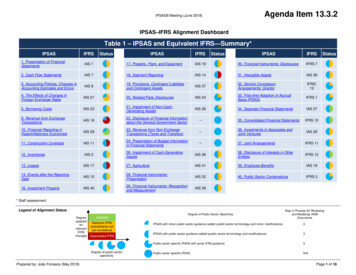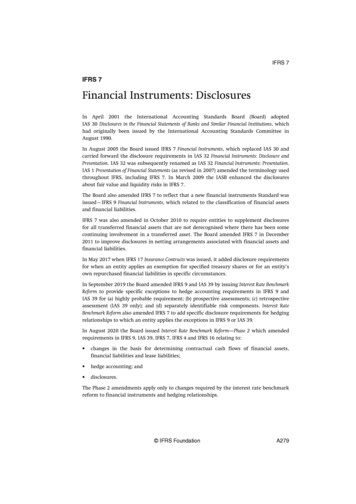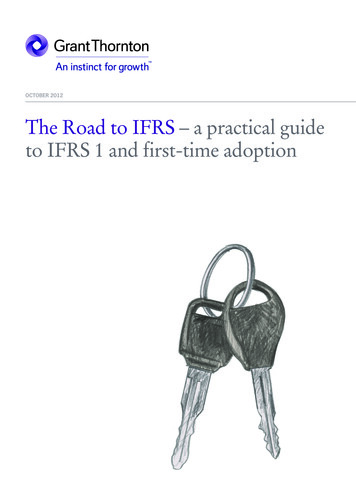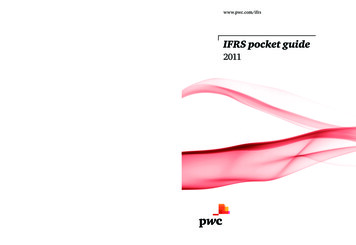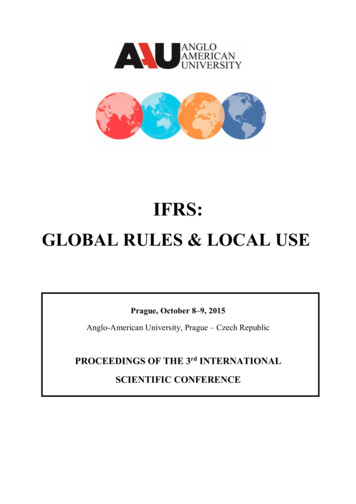
Transcription
IFRS:GLOBAL RULES & LOCAL USEPrague, October 8–9, 2015Anglo-American University, Prague – Czech RepublicPROCEEDINGS OF THE 3rd INTERNATIONALSCIENTIFIC CONFERENCE
EditorsDoc. Ing. Irena Jindřichovská, CSc., Anglo-American University, PragueIng. Dana Kubíčková, CSc., University of Finance and Administration, PragueReviewersDoc. Ing. Jiří Strouhal, PhD., University of Economics, PragueDoc. Ing. Marie Paseková, Ph.D., Tomáš Baťa University, ZlínAuthors only are responsible for the content, bibliographical references and languagecorrectness of this publication. Anglo-American University / Anglo-americká vysoká škola, o.p.s., Prague / Praha, 2015All rights reservedISBN 978-80-260-8675-8 (CD-ROM)ISBN 978-80-260-8676-5 (on-line)
ContentIntroduction . 5IFRS adoption in conditions of Czech SMES – insight into accounting practiceIrena Jindrichovska, Dana Kubickova . 6Is IFRS implementation in emerging jurisdictions a key driver for economic development?A comparative multivariate analysis covering an enlarged European areaCamelia I. Lungu, Chirața Caraiani, Cornelia Dascălu . 21Public sector accounting system reform in Baltic States – the case of Lithuania and EstoniaAlicja Kasperowicz – Stępień, Konrad Stępień . 40Procedures of an audit in the prospective verification of the going-concern principleMariusz Andrzejewski, Tomasz Maślanka . 49Accounting policy and estimated values in the context of the comparability of financialstatements of enterprisesKonrad Stępień, Alicja Kasperowicz – Stępień . 60Communicating uncertainty in financial statement narratives: goodwill impairment testingKarol Marek Klimczak, Marta Dynel, Anna Marta Pikos . 68Shadow accounting and financial statements of the insurance companiesZuzana Juhászová, Denisa Domaracká, Nikoleta Ferová. 83Stock volatility consequences when using the equity method in parent companyFinn Schøler . 87Human capital reporting (HCR) and its linkage with financial performance of companies:evidence from Estonian companies listed on Nasdaq OMX BalticNatalja Gurvitsh, Inna Sidorova, Emilia Startseva . 99Economic entities identification and the role of IFRSVladislav Pavlat . 106Accountants – gravediggers of democracy? How unethical accounting practices increaseinequality and the downfall of democracyGabriele Meissner . 134Global and local perspectives on valuation of domain namesRadka MacGregor Pelikánová, Robert MacGregor . 123Reporting of inventory valuation for purposes of the management accountingGabriela Dubcová, Jana Hlaváčiková . 133
Applying segmented reporting for controlling purposesKatarína Grančičová, Gabriela Dubcová . 141Impact of accounting standards on the results of financial analysisZuzana Kubaščíková, Renáta Pakšiová . 150Summary and final comments. 156List of authors . 157
The 3rd International Scientific Conference IFRS: Global Rules and Local Use, Oct. 8–9, 2015, PragueIntroductionThese proceedings are published to accompany the 3rd year of the international scientificconference IFRS: Global Rules & Local Use, taking place on October 8 and 9, 2015 at the AngloAmerican University in Prague.The proceedings contain contributions prepared and authored by conference participantspresented during the conference. The contributions were reviewed and accepted by the editorial teamand group of external reviewers.Subject distribution of papers and abstracts into sections:Thursday - October 8th Plenary session– Presentation of conference keynote speakers ACCA Student Workshop (meeting of doctoral and master degree students withrepresentatives of the global body for professional accountants ACCATopic: Ethical Dilemmas in Business and Accounting)Friday – October 9th Morning section I– Financial Reporting and Implementation of IFRS Morning section I continue – Financial Reporting and Implementation of IFRS. Parallel section I– Effects of IFRS on Financial Markets Parallel section II– Human Capital, Ethics and Reporting Issues Closing section– Contemporary Issues of Management and ReportingAUTHORS OF THE CD Doc. Ing. Irena Jindřichovská, CSc.Ing. Dana Kubíčková, CSc.Prague, October 2015ISBN 978-80-260-8675-8 (CD-ROM)ISBN 978-80-260-8676-5 (on-line)5
The 3rd International Scientific Conference IFRS: Global Rules and Local Use, Oct. 8–9, 2015, PragueIFRS ADOPTION IN CONDITIONS OF CZECH SMES –INSIGHT INTO ACCOUNTING PRACTICEIrena JINDRICHOVSKAAnglo-American University, Pragueirena.jindrichovska@seznam.czDana KUBICKOVAUniversity of Finance and Administration, Praguedana.kubickova@centrum.czAbstract: In the Czech Republic since 2011 subsidiaries and affiliated companies, whose parent companiesare required to prepare the financial statements according to IFRS, may prepare their separate financialstatements in accordance with IFRS.As it has been recently verified, there was no significant interest on theside of Czech companies to use IFRS. This change in accounting regulation was aimed to remove some of thebarriers in IFRS adoption, especially imbalances between the costs and benefits of its usage. The aim of ourresearch was to reveal the changes in the way how companies accept the changes in accounting regulationand reasons of rather slow and hesitant IFRS adoption. To gather the empirical data we used thequestionnaire survey method. We have obtained answers of approximately 300 Czech SMEs, which weresubsequently analysed. The results indicated that the main causes of the lack of interest in IFRS usageremain the imbalances between costs and benefits of practical implementation of IFRS and hesitation on theside of business partners or foreign owners of majority of Czech companies. The aim to report reliably andto provide comparable information for the purposes of capital markets plays a minor role in deciding on theIFRS usage.Keywords: effects of IFRS implementation, accounting harmonization, small and medium enterprises1. INTRODUCTIONIn the Czech Republic since 2011, subsidiaries and affiliated companies, whose parent company isrequired to prepare the financial statements according to IFRS, may prepare separate financialstatements in accordance with IFRS. This is possible under amendments to the Act no. 563/1991Coll. Accounting. This regulation can be applied even to subsidiaries with Czech parent company.As it has been recently verified, there was no significant interest on the part of companies toexercise this option. The main reason seems to be the obligation to determine the tax base accordingto Czech accounting standards (or alternatively, to adjust the tax base determined from IFRS toCAS, if the company keeps parallel accounting schemes.We assert that the situation would have been different if the companies could apply otherinternational standards for the tax and also for regulatory purposes. However the impact of thischange on the fiscal situation of the country is not yet verified, and therefore the change are not yetenvisaged.Advantages of using IFRS:From the perspective of auditors and financial management practices are the positive effects of thischange for the subsidiary companies. The effects are usually delineated as follows (Machová,2012): The first advantageous the simplification of the process of producing financial statements ofthose companies that are part of financial groups. It is not necessary to provide a compilation ofstatements (resp. Attachments) according to CAS, although the obligation to perform dataconversion by CAS for tax purposes remains.6
The 3rd International Scientific Conference IFRS: Global Rules and Local Use, Oct. 8–9, 2015, Prague The next advantage is that IFRS provides better conditions for interconnection with managerialaccounting, which is achieved by improving communication and streamlining information anddecision-making process within the company and the entire group. Another advantage, which can be realized only by some companies, is a higher volume ofretained earnings as a result of applying IFRS procedures used for dividend payments. However,this is not the standard treatment and other companies that introduce IFRS may even perceivea negative impact on undistributed profits. The next potential advantage is an easier procedure to obtain bank loans, as banks already takeIFRS reporting for granted. The advantage for the subsidiaries is also the fact that they are moreintegrated and better prepared for the restructuring of the parent company and or any capitaltransactions e.g. split ups or spin offs from the group companies, and their combined IPOs). The use of IFRS becomes an advantage when a company participates in internationalcompetitions, where the IFRS is frequently required. The IFRS thus contributes to the increase ofthe global competitiveness of the company.Disadvantages:On the other hand potential disadvantages of using IFRS in Czech companies have been alsomentioned: The main disadvantage is the requirement to calculate the tax base according to procedures ofCAS and connected conversion of selected data from IFRS to CAS. Another disadvantage is the costs of training of accounting staff and modification of accountingand information systems. A further disadvantage is that financial statements under IFRS are generally larger and morelaborious than under CAS. From the point of view of subsidiary the disadvantage is that separatefinancial statements under IFRS must be reported even for those items that were eliminated dueto consolidation of the parent.The Czech economy is an open export economy, dependent to a large extent on exports ofgoods and services. It belongs to the transitioning economies that transformed from a centrallyplanned economy to a market system by means of voucher privatization in 2001 and 2003.Subsequently the country created a new accounting system suitable for market conditions.It could be presumed that the positive effects of IFRS adoption will affect large number ofcompanies and they will be interested to use it, irrespective of size, industry and ownership.Surprisingly, the opposite is true: The implementation of IFRS into Czech accounting legislationand into accounting practice in terms of Czech companies is very low and slow. This can beattributed to resistance to change. The causes of this fact can be seen on many levels. The aim ofthis article is to identify the main reasons of the lack of interest in IFRS reporting with a specialattention to the area of SMEs from the point of view the financial manager and accountingpractitioners1. As the main causes of the lack of interest in IFRS usage are as was showed by results1Upon the EU Commission the firms are classified according to four criteria: number of employees, yearly turnover,value of total assets and firm s independence. These criteria a distinguish free respectively four categories of firms (sellAct No. 47/2002 Col on support of small and medium enterprises):FirmsNumber of employeesTurnoverAssetsMicro firmsLess than 10Less than 2 mil EURLess than 2 mil. EURSmall firmsFrom 10 to 50From 2 to 10 mil EURFrom 2 to10 mil. EURMiddle firmsFrom 50 to 250From 10 to50 mil EURFrom 10 to 43 mil. EURLarge companiesAbove 250Above 50 mil EURAbove 43 mil. EURThe criteria of yearly turnover and total assets are alternative: If one of them is fulfilled then the firm falls in the category ofSMEs. The firm s independence is defined as absence of ownership. The firm is not owned by any other subject from morethan 25 per cent and it does not own other subjects form more than 25 per cent.(In: Regional board of Moravia andSilesia (2013): Methodical instruction: Definition of small and medium enterprises. Available at:file:///C:/Documents%20and%20Settings/ Uzivatel/ Dokumenty/ mp definice msp 1 06%20(1).pdf, Accessed on 28.3.2015)7
The 3rd International Scientific Conference IFRS: Global Rules and Local Use, Oct. 8–9, 2015, Pragueof previous research (Mullerová et al., 2010, Paseková, 2012, Kubíčková, 2013) in general theimbalances between costs and benefits of practical implementation of IFRS and a lack ofrequirements to report with the use of IFRS on the side of business partners of majority of CzechSMEs and almost no incentives coming from the area of capital markets. We attempt to reveal towhat extend do these causes affect the decisions of SMEs in CR at present, after the changes inaccounting regulation in 2011.2. LITERATURE REVIEWThe scope and method of implementation of IFRS in SMEs in local conditions has been dealt withby many researchers. The findings confirm that the scope of IFRS implementation, its effects andaccompanying problems are significantly influenced by factors that are rooted in the nationaleconomic, social, cultural and historical environment (Nobes and Parker, 2012; Borker, 2012;Beneisch et al., 2012; Albu N., Albu C., 2014). Another important point is the nature of thetransition economies, albeit in different countries to varying degree (Sucher, Jindřichovská, 2004,Žárova and Mejzlik, 2011; Kubíčková et al., 2012; and 2013; Albu, 2013; Albu et al. 2013, andKilicaa et al. 2014; Procházka and Pelák, 2015). Different approaches of IFRS application havebeen practiced over times, e.g. Albu et al. (2013) discuss the Romanian approach and find that intransitional countries stakeholders mostly support the convergence approach. However, usersoppose convergence and prefer the adoption of IFRS for SMEs. The convergence approach movesregulators' attention from users' needs to preparers' preferences and their preparedness. This findingis relevant in the decision-making process of national regulators.According to Ionascu et al., 2014, results obtained so far show that the Romanian economicenvironment is to a certain degree open to IFRS and is optimistic about their potential, althoughthere are compliance issues and institutional factors that can diminish their benefits.Similarly Kubíčková et al. (2013) find that in the Czech Republic the use of IFRS for SMEsis relatively low to significantly increase the number of companies using IFRS. The reason for IFRSapplication is usually a requirement of the parent company. The motivation for adoption arises frombusiness partners or from the requirements of the bank or the intention to enter the capital marketonly in very few cases. Also the effects of adoption in transitional as well as developing countriesmove out of the financial market into the companies’ management and improvement of legislativeregulations governing the reporting process.From the macroeconomic perspective of national economic the effects of adopting IFRSare generally associated with an increase of interest of in foreign investors. This leads to greatervolume of FDIs with all the positive impacts on the economy, such as growth of jobs, GDP growth,etc. were analysed on different markets e.g. Leuz and Wysocki, 2008; Daske et al., 2008, and morerecently by Gordon, et al., 2012; Brüggemann, et al., 2014.Another expected positive effect is the development of international business – thecomparability and transparency of financial information will encourage interest in export andimport. Along with this there is an expectation of greater labour mobility. A further positive effecton this level is then placed to support and develop the capital market (Prochazka and Pelák, 2015).3. DATA SOURCE AND RESEARCH METHODThe questionnaire survey method was used for investigation of the current state of IFRS adoption inCzech SMEs. The research was conducted in March and April of 2015. The questionnaire hasdeveloped on basis of previous research conducted with the same purpose three and five years ago.Those have concentrated primarily on Czech SMEs (Mullerova, et al., 2010; Kubíčková et al.,2013). The present research has broadened the scope to include other enterprises and subsidiaries of8
The 3rd International Scientific Conference IFRS: Global Rules and Local Use, Oct. 8–9, 2015, Pragueinternational companies, which were originally Czech SMEs and subsequently became parts ofinternational groups.The questionnaire aimed to investigate the current state of adoption of IFRS by Czechenterprises and identify the conditions for possible positive effects of the use of IFRS. Apart fromthe questions concerning the accounting and way of bookkeeping practices, there were alsoquestions concerning the foreign business partners and activities or intentions of firms, which couldrequire financial information according to IFRS (e.g. entering the capital market).The construction of the questionnaire was based on two dominant hypotheses:I. The need of IFRS reporting in condition of Czech SMEs arises from the business contactswith suppliers and customers rather than from the needs of financial source (banks, capital market).II. The IFRS usage in Czech SMEs is under the influence of foreign trade orientation of theCzech economy.In practice, a database containing e-mail contacts of chief financial officers and chiefaccountants of 1,613 Czech medium and large firms was used for the research. In total we haveprocessed 258 completed questionnaires that mean a response rate of 15.99 per cent. Thepredominant share of the sample represented medium businesses, whilst small firms representedless than 15 per cent. The sample included 77 companies which exceed the thresholds for SMEdefinition and belonged to group of big firms plus there were only a small number of micro firms.The structure of the respondents according to industrial sector is in table 1:Table 1. Sample er ofrespondents63713877258Industrial ource: own researchThe questionnaire consisted of five parts: the first part aimed at identification of the respondent. Thesecond part investigated the potential reasons for IFRS adoption, i.e. cooperation with the foreignpartners (suppliers, customers). In this part were investigated the intentions to establish someforeign contacts as a potential stimuli for the IFRS adoption in the future years. The third part wasaimed at investigation of the degree of involvement of IFRS in the SMEs accounting practice (howare their accounts kept) and to what extent are IFRS already a part of SMEs economic practice.The fourth part concentrated on the most demanding issue in firms’ accounting (what is the mosttime consuming and most complicated accounting issue), and the fifth part investigated the opinionsof the IFRS experience (opinions of IFRS users and non users).We have used the SPSS software to analyse the responses obtained. We have investigatedthe correlations between surveyed variables. We used the Pearson's correlation coefficient anda sign test. Sign testis a nonparametric method of evaluating the hypothesis of partial independencein the pivot table. It expresses the relative deviation from the situation when both variables in thecontingency table are independent from each other. The cell is coloured in the event that a givencell meets this criterion of deviations from independence criterion (i.e. it implies dependencebetween cases in row and column). Positive deviation is expressed in black (see Annex B),a negative deviation is coloured in grey (see Annex B). Any such deviation is significant at a fivepercent α 5% level of significance (i.e. with min. 95 per cent certainty). When there is norelationship between number of cases in rows and columns then the cell in the table is not9
The 3rd International Scientific Conference IFRS: Global Rules and Local Use, Oct. 8–9, 2015, Praguehighlighted. Each shaded cell defies the case of independence of both variables in the table withmin. 95% certainty, i.e. it indicates that both variables are interdependent.4. THE RESULTS AND INTERPRETATIONThe results show, that more than a half of the companies (63 per cent) have some business contactsabroad (suppliers, customers, parent). The foreign contacts were established mainly with importantsuppliers, followed by links to the parent companies, and major customers. The results show thatthe nature of international contacts almost always represents commercial interests of the companyrather than possibility of access to capital resources. This corresponds to the nature of the Czecheconomy with a large export segment. Foreign contacts are of various kinds – one company canhave multiple links: a contact to its parent company as well as to foreign suppliers and customers.In the part in which we investigated the state of IFRS adoption we have asked whethercompanies report under other than Czech accounting standards in addition to compulsory Czechstandards. There were 81 firms i.e. 34 per cent of companies that prepare financial statements inaccordance with CAS plus another system of accounting standards. These companies prepared thestatements mostly according to IFRS (70 companies, 28 per cent). Only a few companies (11 firms,6 per cent) used US GAAP (5 firms) or other standards (6 firms) – German standards HB2(3 firms), French GAAP (2 firms) and UK GAAP (1 firm).The share of companies using IFRS along with CAS is about the same in manufacturing andtrade sectors. It is higher in services and a bit lower in construction and agriculture. This reflects thestructure of Czech economy – its business and foreign trade orientation.One Interesting finding concerns the way financial statements are prepared according toIFRS. The respondents stated that the most frequent method of preparation of IFRS statements isthe so-called “transformation bridge” (48 per cent). That means that the firms do not use IFRS totrack transactions to report individual items of their assets and liabilities based on IFRS principles,but they construct their IFRS statements from the original Czech version of statements compiledbased on Czech accounting principles. Other group of firms-IFRS adopters were preparing two setsof accounting books (28 per cent). And 14 per cent of firms reported only selected items inaccordance with IFRS. For more details see table 2.Table 2. The accounting standards usage, keeping accounts and financial statementsAccounting standards used besides CASIAS/IFRS% (abs.)27 (70)US GAAP% (abs.)4 (10)Other% (abs.)3 (9)No% (abs.)66 .364.385.785.7Business ltureAccounting is kept by:Own employeesAccounting firmIndividual accountant92% (238)6% (16)*2% (4)Creation of financial statements according to IFRS:Transformation bridge from CASKeeping two independent accounting booksOnly selected items translation from CASDifferent way482814104020202067111111-Source: own research*Note: Just five operating accounting firms offer preparation in IAS/IFRS; value in bracketsrepresents number of answers10
The 3rd International Scientific Conference IFRS: Global Rules and Local Use, Oct. 8–9, 2015, PragueThe next part of the questionnaire investigated the factors which could affect the decision of IFRSadoption and the views concerning the benefits of IFRS. In total there are 169 respondents whichdid not use the IFRS. This raises the question: what advantages and in contrast what disadvantagesare perceived by respondents in connection with the use of IFRS (companies that still do not use theIFRS).Only 17 per cent of respondents perceived some benefits from using IFRS, while 83 per centsee no positive effects in the use of IFRS. And only five per cent of IFRS non-adopters consider theadoption of IFRS in the future.It was stated, that the main reason why companies are not yet using IFRS is, that they see norationale: e.g. it is not needed or that it is not required by foreign business partners or foreign parentcompany. Conversely, as the reason for the adoption of IFRS was in 90% of firms (62 firms-IFRSadopters) stated that there was the requirement of their parent company. Here again we can see thespecifics of the position of the majority of Czech companies (SMEs and large companies), whichare no longer separate entities (after privatization or other capital transactions) and their decisionmaking is dependent on their foreign parent companies.Regarding what advantages and benefits are perceived by companies who use IFRS it waschosen most frequently: “Better comparison of accounting data” (69 per cent) and „Easierreporting“ (66 per cent). Only two firms stated that they have easier access to capital markets.Another interesting finding comes from the response of 28 and 22 per cent of respondents thatclaimed that IFRS reporting leads to better use of internal data for in-house managerial accountingand internal reporting respectively. This aspect has been already discussed by Prochazka, 2010 andZarova, 2014. This contribution of IFRS has more importance for Czech companies than others. Avery low number of respondents perceived the importance of use of IFRS for easier access to bankloans or capital markets (3 and 2 per cent respectively). This can be understood as a reflection of thebasic purpose of IFRS. But it is a reflection of the special conditions of activities of the Czechfirms. From the standpoint of banks IFRS is not required as reliable statements of financial positionand the role of capital market are still very low. (For more details – see table 3)Table 3. Responses of IFRS non-adoptersNon-adopters (147 companies)Will you consider IFRS adoption?Yes5%No95 %Main reasons for not adopting IFRS%No benefits for companyDon’t know about benefits of IFRS usageCompany is not issuer of securitiesOtherDon’t have a foreign business partner382914119Are there any potential benefits from IFRS adoptionfor your company?YesNo17%83 %What would be the benefits of IFRS%adoption?Better comparison of accounting data69Easier reporting66Higher credibility for business partners47Better public perception28Better usage of data for business management28Better quality of inter-company information22Better access to EU funding13Getting loans easier3Source: own researchOne of the important reasons of IFRS non adoption was quoted relatively high cost oftransition to the other base of reporting. This factor could be very restrictive especially for SMEs.Regarding costs associated with transition to IFRS, there were most frequently reported costs werein the range of 5 per cent of firms annual turnover (in case of 31 per cent of respondents). The mostfrequently reported kinds of costs were the cost of training (67 per cent), consulting services (51 percent) and IT adjustments (43 per cent). See table 4.11
The 3rd International Scientific Conference IFRS: Global Rules and Local Use, Oct. 8–9, 2015, PragueTable 4. Responses of IFRS adoptersIFRS Adopters (71 companies)The costs of IFRS implementation[% of business turnover]Types of costs (%)Preparation of IFRS statementsImplementation of other standards 0,050,05–0,50,5–1 329Training6720Salary2013Other66Source: own researchFor better presentation of the collected data, primarily to confirm or refuse the assumption ofmutually conditioned characteristics, we analysed correlations between selected characteristics andwe have used sign test for the detection of significant relationships. The results are summarized inAppendices A and B.The result of the survey of mutual relationships (correlations) between the studiedcharacteristics were confirmed by a relatively high degree of positive correlation between the use ofIFRS and foreign ownership of companies (see box a5) and other links or foreign contacts (parentcompany) (see box a8). Other correlations reach rather low values. Significant values of correlationcoefficient confirm logical links (see light grey boxes), for example – that there is a strongercorrelation between foreign ownership and trading with foreign entities and/or between whethercompany trades with foreign partners and those who intent to start using IFRS. This confirms that inCzech firms IFRS are more associated with foreign trade than with trading on capital markets.For values of the Pearson correlation coefficient the sign is important. It indicates the direct(positive sign) or indirect (negative sign) dependency between the investigated characteristics. As itcan be seen, the sign between the size of total assets (g) and ownership by a foreign company (5) isnegative. This indicates indirect dependence, i.e. larger firms measured by total assets are lessfrequently owned by foreign entities. The analysis was then performed on the results of thequestionnaire, wh
The 3rd International Scientific Conference IFRS: Global Rules and Local Use, Oct. 8-9, 2015, Prague Introduction These proceedings are published to accompany the 3rd year of the international scientific conference IFRS: Global Rules & Local Use, taking place on October 8 and 9, 2015 at the Anglo-American University in Prague.


